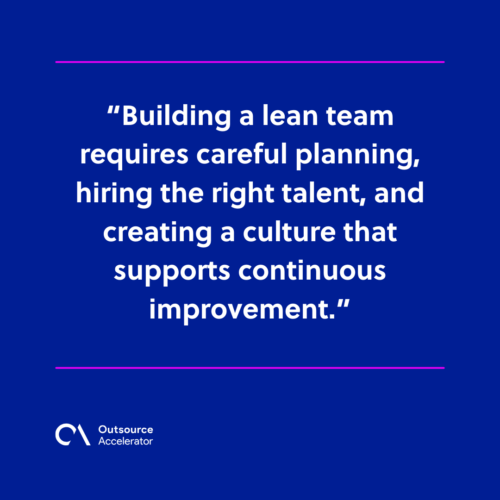Your complete guide to building a lean team

Building a lean team is becoming increasingly important in today’s business environment. It requires strong leadership and ongoing team development as key to becoming successful.
This guide will explore the facets of a lean team and how to build and utilize one effectively in the workplace.
What is a lean team?
A lean team is a small group with the necessary skills and expertise to make quick decisions and deliver high-quality work within tight deadlines.
Each member has unique skill sets to accomplish various tasks and responsibilities in a project.
Every member plays a crucial role in the team’s overall success, making their contribution vital to the organization’s achievements.

Benefits of building a lean team
Building a lean team offers numerous benefits for organizations. Let’s explore the three key advantages:
1. Increased efficiency
With a lean team, organizations can achieve increased efficiency in their operations. With fewer team members, a streamlined communication and decision-making process results in getting more work done.
This productivity boost allows organizations to meet deadlines and deliver projects on time, giving them a competitive advantage in the market.
2. Improved collaboration
A crucial benefit of building a lean team is improved collaboration among team members. A smaller team means members clearly understand their roles and responsibilities, creating an environment where teamwork is highly valued.
By nurturing collaboration, organizations can harness the collective intelligence of their team members.
3. Flexibility and agility
Lean teams have the agility to adapt to changing circumstances. Organizations with fewer team members can easily pivot and respond to market trends and customer demands.
Flexibility from lean teams allows organizations to stay ahead of the competition and remain resilient in dynamic business environments.
Challenges of working in lean teams
While there are significant benefits to building a lean team, it is important to be aware of the challenges that come with it.
Let’s explore the three main challenges:
1. Increased workload
In a lean team, team members often assume multiple roles and responsibilities.
They are expected to be versatile and adaptable, which can lead to an increased workload. It can sometimes result in burnout and decreased job satisfaction.
Organizations should ensure that team members are adequately supported and provided with the necessary resources for effective workload management.
2. Limited specialization
In lean teams, team members must possess a broad range of skills and knowledge.
While this promotes flexibility, it can also limit specialization. Without specialized expertise, certain tasks may not be executed with the same level of proficiency as in larger teams.
To overcome this challenge, organizations can provide training and development opportunities for team members to enhance their skills in specific areas.
3. Communication and coordination
Every team member’s input and contribution are highly valued in lean teams. However, coordinating schedules and ensuring effective communication can be challenging, especially when team members work remotely.
Organizations should invest in collaborative tools and establish clear communication channels to address this challenge to facilitate efficient information sharing.
How to create a lean team
To create a lean team, organizations should follow these five steps:
1. Define clear responsibilities
Defining clear roles and responsibilities for each team member is essential. This ensures that everyone understands their specific tasks and areas of expertise.
2. Hire the right talent
Hiring the right talent is crucial in building a lean team.
Look for individuals with the necessary skills and experience to thrive in a fast-paced environment. This applies not only to hiring team members but also to leadership hiring.
Hiring the right talent directly contributes to the overall success and productivity of the team.

3. Foster a supportive culture
Encourage open communication, trust, and collaboration among team members.
Employee productivity and job satisfaction are enhanced by fostering an environment where everyone feels valued and supported.
4. Establish clear metrics
The team must establish clear metrics to ensure accountability and measure success. This provides a sense of direction and helps team members prioritize their work.
Clear metrics also allow organizations to evaluate the effectiveness of the lean team and make necessary adjustments.
5. Invest in technology and tools
Organizations should invest in technology and tools that streamline workflows and facilitate collaboration to maximize efficiency.
Project management software, communication tools, and automation solutions can enhance the productivity of the lean team.
Tips for implementing a lean team
To implement a lean team effectively, consider these four tips:
1. Provide ongoing training and development
To support the growth and development of team members, provide ongoing training and development opportunities. This helps team members expand their skill sets and stay updated with industry trends.
Encouraging a culture of continuous learning and improvement enhances the abilities of the lean team.
2. Encourage innovation and creativity
Lean teams thrive on innovation and creativity. Let staff think outside the box and explore new ideas.
Foster an environment where calculated risk-taking is encouraged, as this can lead to breakthrough solutions and advancements.
3. Regularly evaluate and refine processes
Regularly evaluate team processes and workflows to identify areas for improvement. Seek feedback from team members and implement changes that enhance efficiency.
Cultivate a culture of continuous improvement to ensure the lean team is constantly evolving and optimizing their performance.
4. Promote work-life balance
Despite the demands of working in a lean team, it is important to prioritize work-life balance. Encourage team members to maintain a healthy work-life balance to avoid burnout and maintain long-term productivity.
Utilizing a lean team in the workplace
Building a lean team requires careful planning, hiring the right talent, and creating a culture that supports continuous improvement.

Implementing a lean team in the workplace can significantly benefit organizations. By maximizing efficiency, promoting collaboration, and fostering flexibility, lean teams can help organizations stay competitive.
However, it is essential to acknowledge and address the challenges of working in lean teams, such as increased workloads and limited specialization.
Organizations can overcome these challenges by providing adequate support, clear communication, ongoing training, and creating a lean team that delivers high-quality work.







 Independent
Independent




